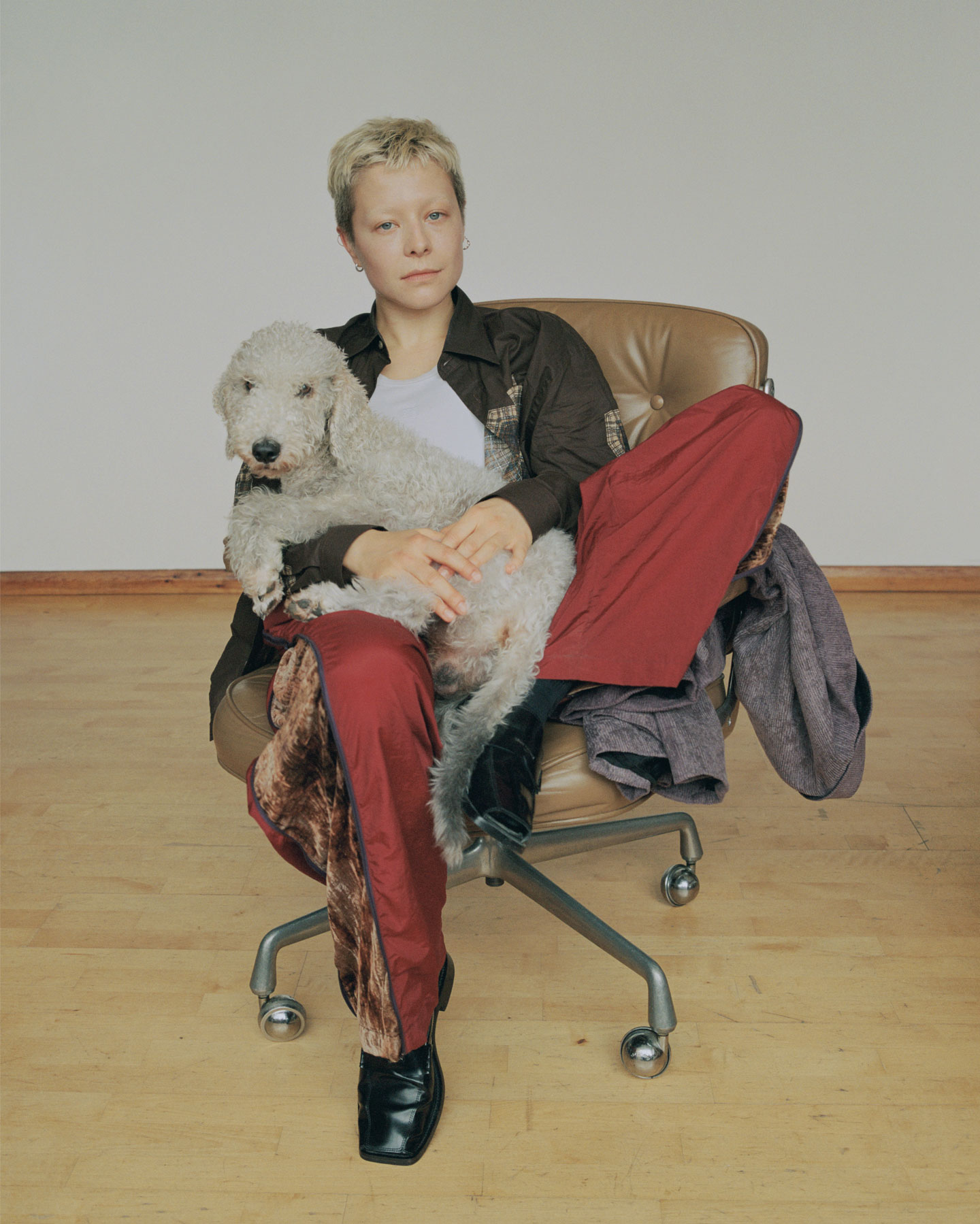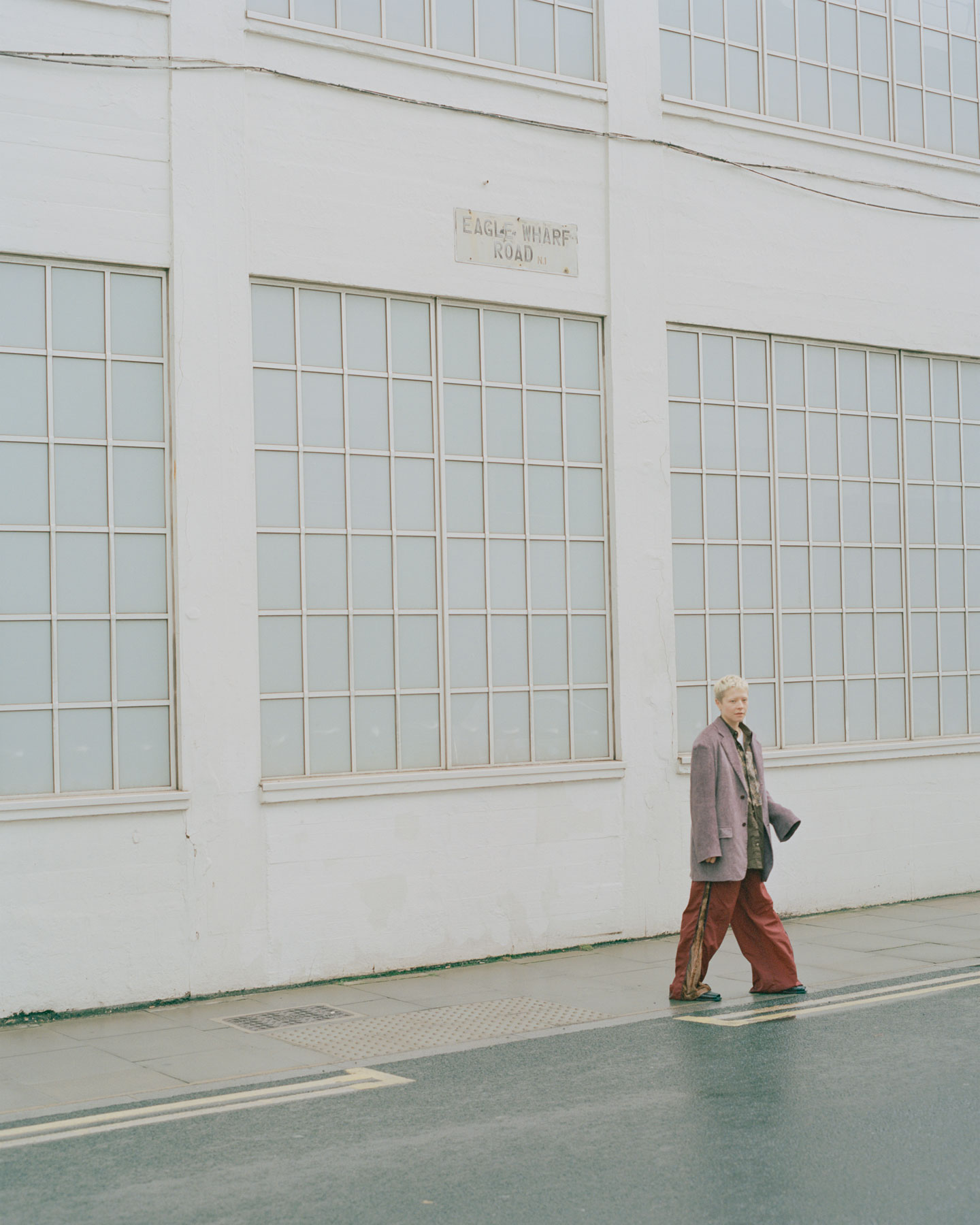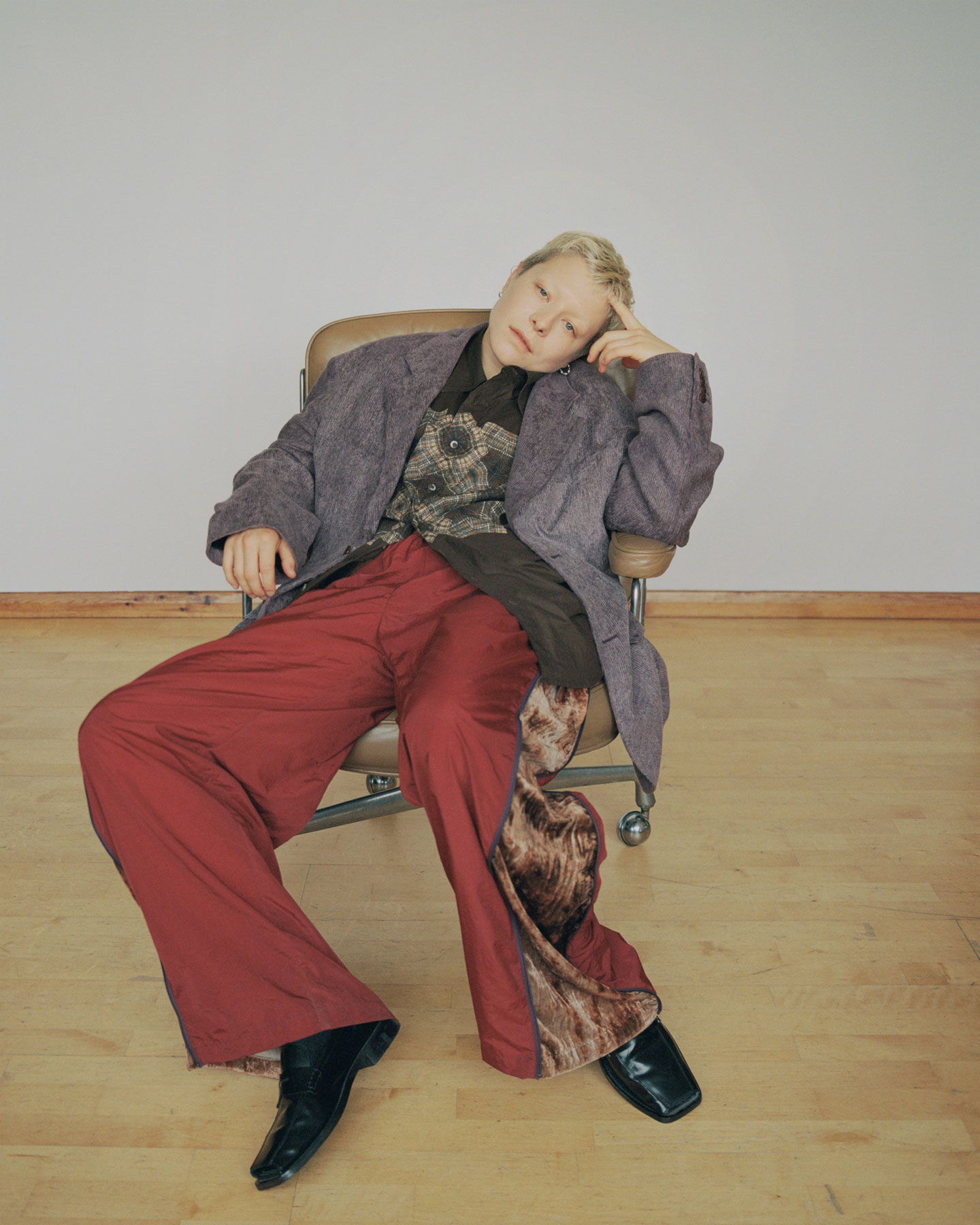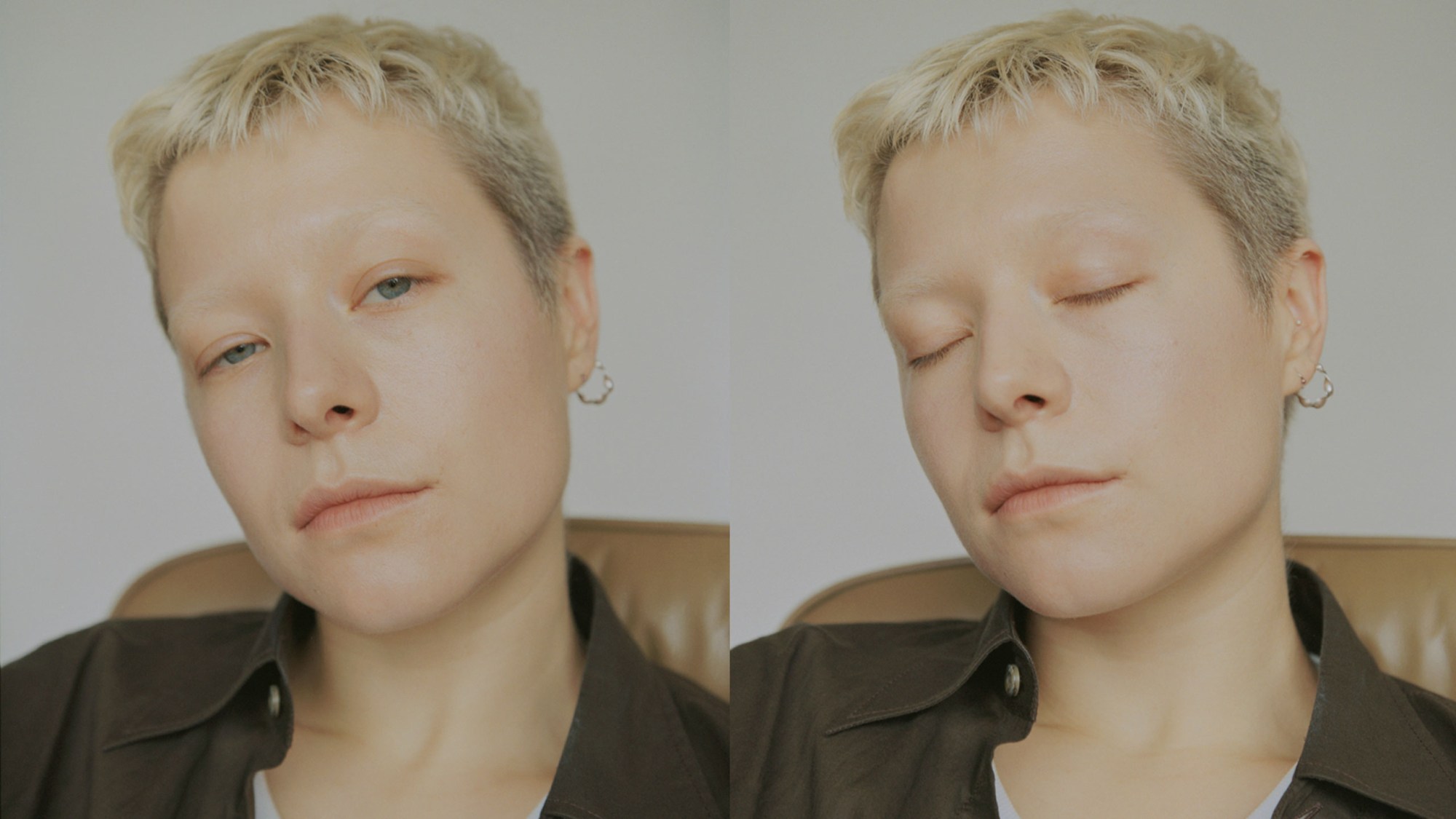Last night, the world met Emma D’Arcy screaming and covered in blood. Season one of HBO’s House of the Dragon reached its midpoint and, as the scales tipped over into episode six, viewers were catapulted 10 years into the future (approx 190 years before the start of Game of Thrones). With the time jump, Milly Alcock passes the brilliant, complex role of Rhaenyra Targaryen — daughter of King Viserys and heir to the Iron Throne — over to Emma, a 30-year-old nonbinary actor from London, whose life is about to change immeasurably.
While Rhaenyra might have grown up, we still find her at the centre of what Matt Smith — who plays Daemon Targaryen, Rhaenyra’s uncle and sometimes lover — has described as an “incestuous, volatile, sociopathic family”. Case in point: Emma’s very first scene sees Rhaenyra giving birth and minutes later, weak but determined, proceed to carry her newborn across the vast Red Keep at the command of her childhood best friend (the queer energy between them was palpable) turned calculating stepmother, Queen Alicent Hightower. Thanks to the set being an actual three-storey castle, built for the occasion inside a soundstage in Watford, the camera tracks the entire procession across several very intense minutes. It’s quite the introduction.

Emma is worlds away from Westeros when they FaceTime me from a “random carpark somewhere between Bloomsbury and Oxford Circus,” just two weeks before their House of the Dragon debut. “I don’t love this moment,” they say of the purgatory. “I really liked the bit before the show started airing though, I enjoyed that liminal space.” The time since has been a blur of premieres, interviews and red carpet events — Emma’s first press tour. “I don’t know if it’s a natural environment for anyone really,” they say, suggesting it’s almost certainly not for them. “But I feel like doing press for House of the Dragon has taught me that, you know, a full mask and armour is the minimum that I require.”
Emma is, of course, referring to the playful looks they’ve crafted with stylist Rose Forde: a gold Acne tunic and beaded gloves to one premiere; an oversized Marni suit with theatrical makeup to another. “I guess part of it is that you’re offering up a version of yourself, right? I’m very early in the journey of understanding what it means to have any part of yourself in the public domain, but I feel more comfortable with that being a version of myself that’s two steps to the left. And I really do derive a lot of energy from the transformative power of makeup: it’s literally a mask.”

Emma has a background in theatre, having starred alongside Ben Whishaw in Christopher Shinn’s critically acclaimed Against at London’s Almeida in 2017; as well as in TV shows like Nick Frost and Simon Pegg’s Truth Seekers and Wanderlust with Toni Collette, both of which aired in 2020. This will be their meatiest, and certainly widest reaching role yet. In many ways, Emma has been working towards this moment since they played Titania in their Year Six musical adaptation of A Midsummer Night’s Dream. “I remember coming out of the school hall and just running, running, running around the field,” they say. “I guess it was my first dose of that very specific adrenaline-endorphin cocktail that I’ve always found pretty addictive.”
Something that first drew Emma to the role of Rhaenyra is the character’s awareness, even at a young age, of how rules apply differently to men and women. Rhaenyra’s not allowed to ride her dragon, Syrax, into battle alongside her uncle; her political suggestions are dismissed; and, most significantly, when her father names her as next in line to rule over the seven kingdoms, neither the decision nor the heir are taken seriously. “As a child, I was sort of obsessed with masculinity; obsessed with the male aura,” they say. “I think I was responding to the way in which we condition and contextualise men and women differently. I craved the right to take up space in the way that I perceived men did.”

This connection is perhaps what led Emma to return to one of their favourite books when preparing for the role of Rhaenyra: Maggie Nelson’s The Argonauts. “Ugh, an extraordinary book,” they enthuse of 2015’s cult piece of autofiction that tracks Maggie’s relationship with her trans, genderfluid partner and her experience of pregnancy with their child. “I feel like it should be a set text. I came back to it for Rhaenyra’s journey through motherhood because Maggie Nelson writes about what it means to be someone who feels that they are, to some extent, at odds with the heteronormative framework, but who simultaneously goes on this journey into something that is co-opted, I suppose, by heteronormative patriarchy, so it felt really appropriate here.”
In contrast to Milly’s teenage Rhaenyra, unruly and rejecting all that is expected of her, through Emma, we find the Princess in an altogether different state. Though in an arranged marriage with her cousin, Laenor Velaryon (he’s gay but the two of them essentially have an open relationship), she is forced, later in episode six, to send her live-in lover and the assumed father of her children away. “You meet her in a place of intense self-repression, of feeling hyper-visible,” Emma says. “She’s trying to live within a system and maybe for the first time, she’s attempting compromise.” And what about that burning Targaryen fire, evident from the start of the series, that she’s clearly navigating throughout? “I think she’s trying to dampen it. She’s attempting something that looks like conformity, but unfortunately that comes with psychological damage that probably only becomes clear to her towards the end of episode seven.”

Aside from the words of Maggie Nelson, Emma credits Rhaenyra’s long blonde wig as integral to helping them get into character. “A big part of that transition took place in the makeup trailer each day,” they say. “I find wigs particularly transformative: they affect your behaviour, your posture, how you are read — even people that know you react differently. As humans we are so adept at reading even very small visual cues, so when I leave the makeup trailer, the reality I step into is fractionally different already. That wig does a huge amount of work!”
In this interim period, Emma has had time to reflect on the 11 months spent shooting; on all they’ve taken from the experience and all they’ve learnt about their craft and themselves. Dragon-riding, I propose, is a pretty cool life skill to take away from it. “Honestly, the animatronic buck does all the work,” Emma says, “but I haven’t seen the result yet so we’ll find out to what extent I actually pulled that off, won’t we?” The shoot, it transpires, was also something of an acting workshop for everyone involved; affording cast and crew the time and space to figure things out together, on the fly. “I feel like I learnt how to do my job, or at least learn what the job was! And the job here was to show up and be present, which is so thrilling. If you and I are doing two-and-a-half pages of dialogue, say, we’ve probably got the whole day to do it. To start a take and not know what’s going to happen is a privilege that’s not always possible. This wasn’t just a workplace but a space for community and friendships; I feel like I left with a big family.”

Ultimately — dragons and incest and Iron Thrones aside — in House of the Dragon, Rhaenyra’s story is one of self-acceptance in a violent, unjust and patriarchal world. “This journey she’s on is one of understanding that, actually, this fire, this need, this hunger, this appetite that’s in her blood — rather than it being this thing that stops her from being an easier fit within the common culture, it’s actually the thing that will ensure her survival within a system that is looking to underestimate, restrict and undermine her,” Emma says. “Rhaenyra is on a journey to claim her own name and own what she is, as opposed to hiding it.”
And if you’re still, somehow, not convinced that you should start watching the show immediately, Emma sums up the entirety of season one as such: “A family drama in which the players shouldn’t have been trusted with weaponry.” Somebody call HBO and tell them to reprint the posters.
Credits
Photography Piczo
Styling Rose Forde
Hair styling Jody Taylor
Makeup Justine Jenkins


